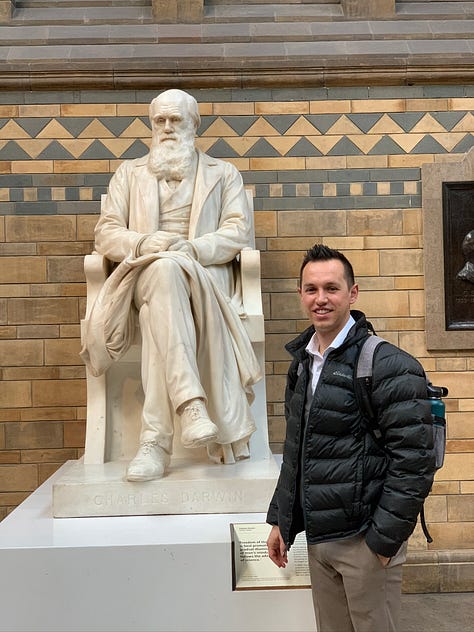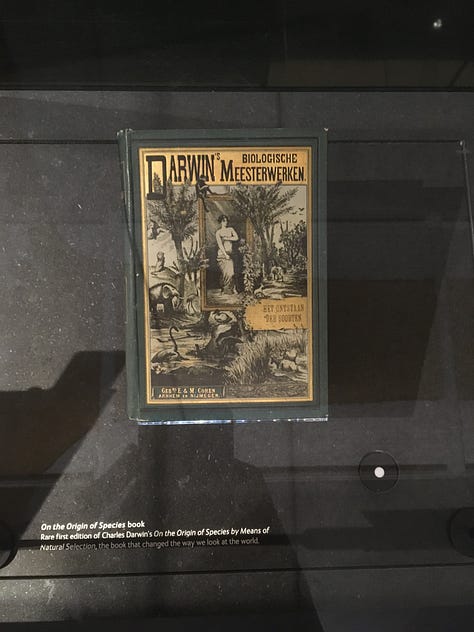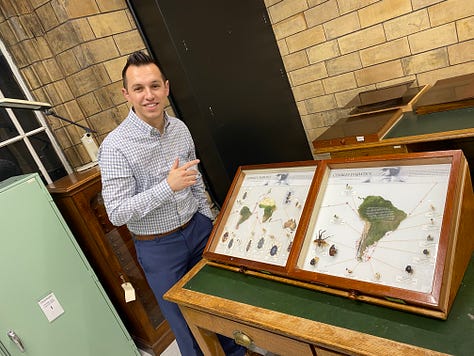Building the important skills
A tribute to Charles Darwin on Darwin day
Charles Darwin spent almost six years traveling on the HMS Beagle as a naturalist collecting animals and plants and observing people from different parts of the world. The ideas he obtained from his travels helped him construct the scientific theory that would be known as Natural Selection. Darwin spent years assembling the theory of natural selection methodically building his argument with the data he collected on his journey around the world. But, because of overbearing religious fundamentalists’ thoughts at the time, Darwin was worried about how people would view his work, so he wrote his ideas up in a manuscript and packed it away with a note to his wife on how to get it published should he die before finding the courage to do so. The theory of natural selection was at this time, Darwin’s burden alone to bear. He did not think his ideas would be accepted. He did not think his manuscript would be published in his lifetime; he thought his ideas would not be known until after his death.
With his ideas written out and set aside, Darwin spent most of his time focusing on Geology and attending scientific meetings. Through these meetings, he started to build a close group of colleagues with whom he started feeling comfortable hinting at his ideas of natural selection. He built friendships with people who helped him move his ideas along. However, over time, other scientists started to think about the world differently than most people at the time (just like Darwin). They were getting closer and closer to Darwin’s idea of natural selection. Darwin was getting nervous, because of how similar they were to his ideas and thoughts. On top of that, Darwin was also getting a glimpse of the future as many of these proposed ideas were being rejected and disgraced in the scientific community. It was during these hard times that Darwin relied on relationships with his friends.
Darwin built a close relationship with a colleague, Joseph Hooker, who studied plants and over time Darwin shared small tidbits about his thoughts on species changing. Many times they also talked about other theories being shared as well. During a written exchange with Hooker, discussing a newly proposed idea, Darwin asked for Hooker’s thoughts, Hooker said “People who know their material properly do not make outrageous claims.” Simply put, the authors who are making these arguments about species, do not know what a species is, so they should be ignored. When Darwin read this letter, he was hurt and shaken a little, because at this time Darwin's ideas were similar to those ideas his friend was condemning, and his friend knew it. However, at this point, Darwin lacked the experience to determine what a species was and was not. Darwin had done very little work on organisms, most of his ideas were based on his geology background and what he observed as a naturalist on the Beagle. The organisms he collected were mostly sent off to other scientists to be described. He did not yet have the skill set to bring forth a complex argument to the scientific community.
What I love most about this story, is how Darwin responded to his friend’s letter. He went to work.
Darwin went to his collections and opened a box full of barnacles, a group of organisms you might find on the side of a boat or attached to rocks underwater, and learned all he could about them. Specifically, he learned how to differentiate between ones caught on one coast versus another, and ended up describing several species himself. He spent the next eight years working with barnacles and eventually became an expert on them.
There are many times in our lives when we receive rejections or find out that we aren’t as awesome as we think we are (I often think this about myself). Maybe we think we should have gotten a promotion because we have been with a company for years, or maybe we think we should have gotten an A in a class, or maybe our life should be easier because we are living right. Only to find out we did not get the promotion or the A, or that difficult trials also happen to great people. The reality is, this is life. We think we are going up, only to be sent down.
Darwin, to me, is a great example of what to do in these situations. When he realized he was not the best person to describe, what would become natural selection, he decided to build the skill he deemed necessary for its future success. The theory of evolution through natural selection is widely known and accepted by scientists and people all over the world because of that choice. He chose to do something that would help him, instead of focusing on him not being good enough.
We can do the same. When life doesn’t go our way, we need to take a step back and figure out what needs work so we can build the important skill(s), and make them so good that they cannot be ignored. It may not be easy, but it will be well worth the time.
p.s. Darwin is someone I look up to as a scientist. Below I shared a couple of pictures from my previous travels to London where I got to see the impact of Darwin on science better.





